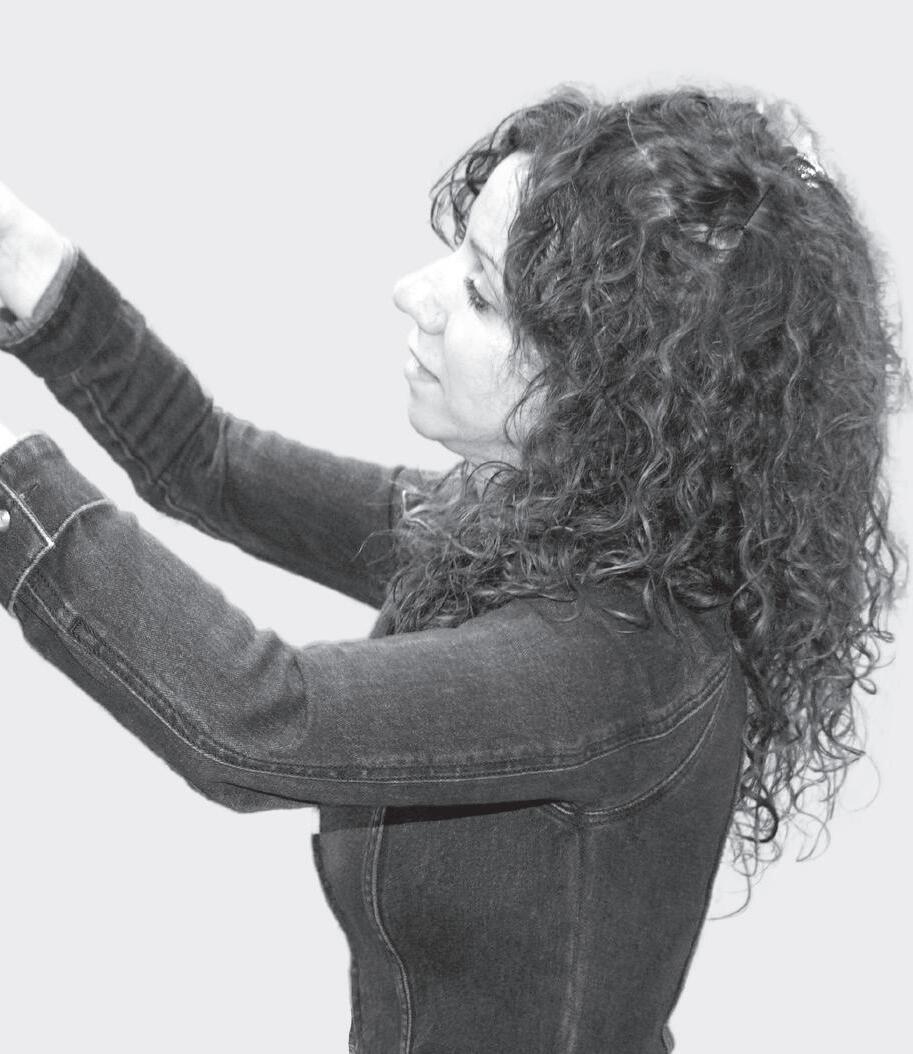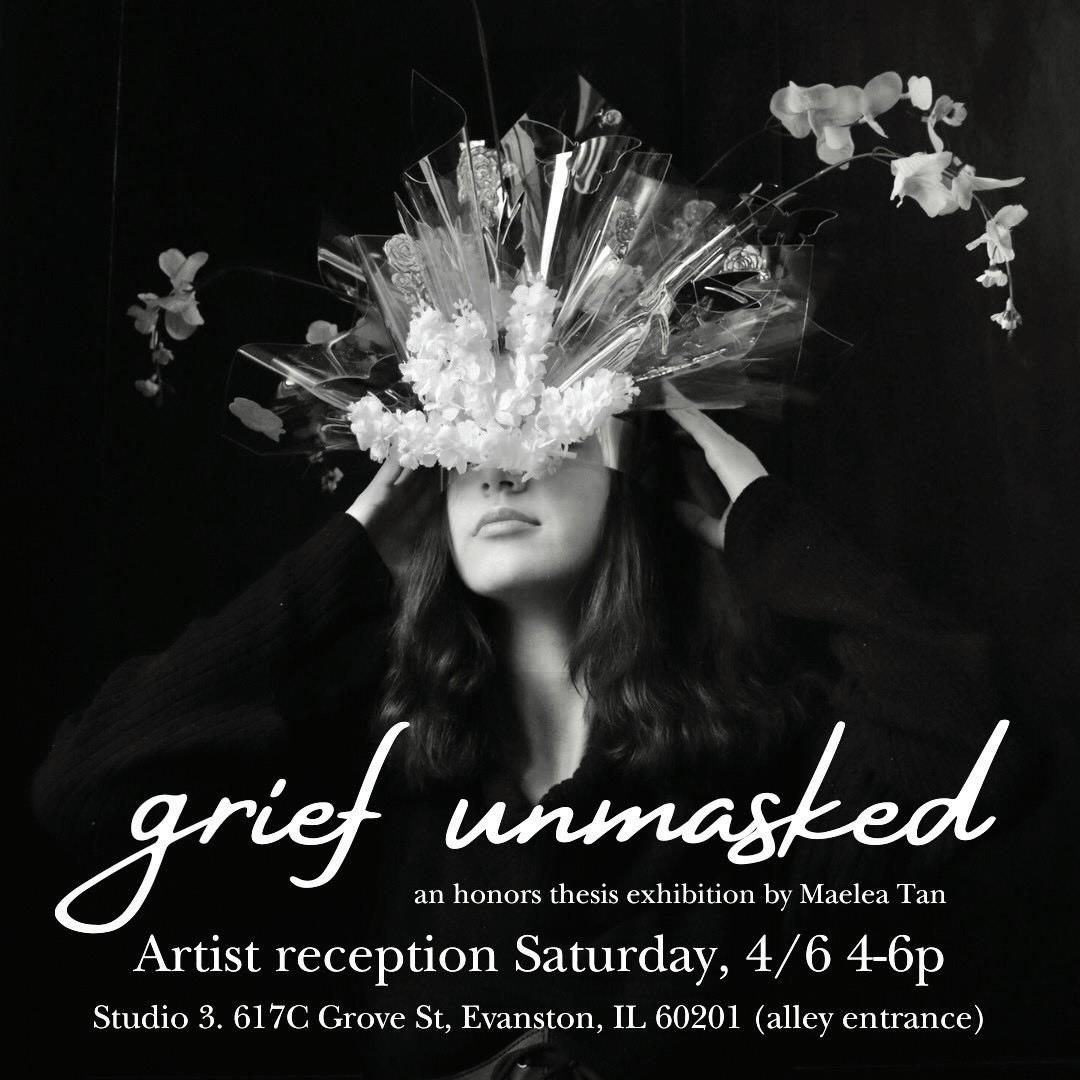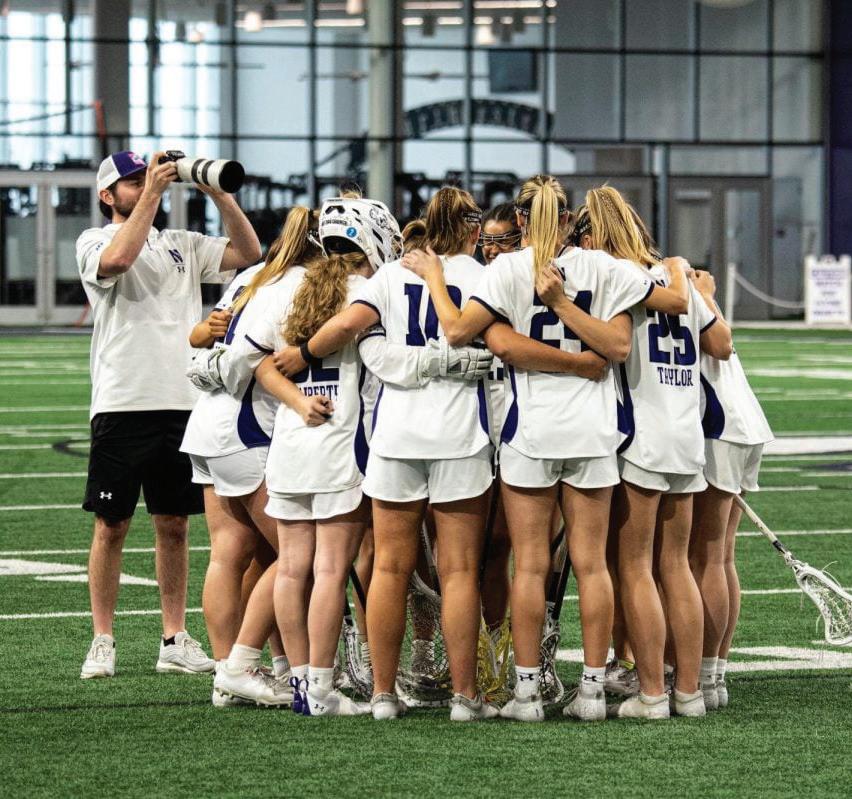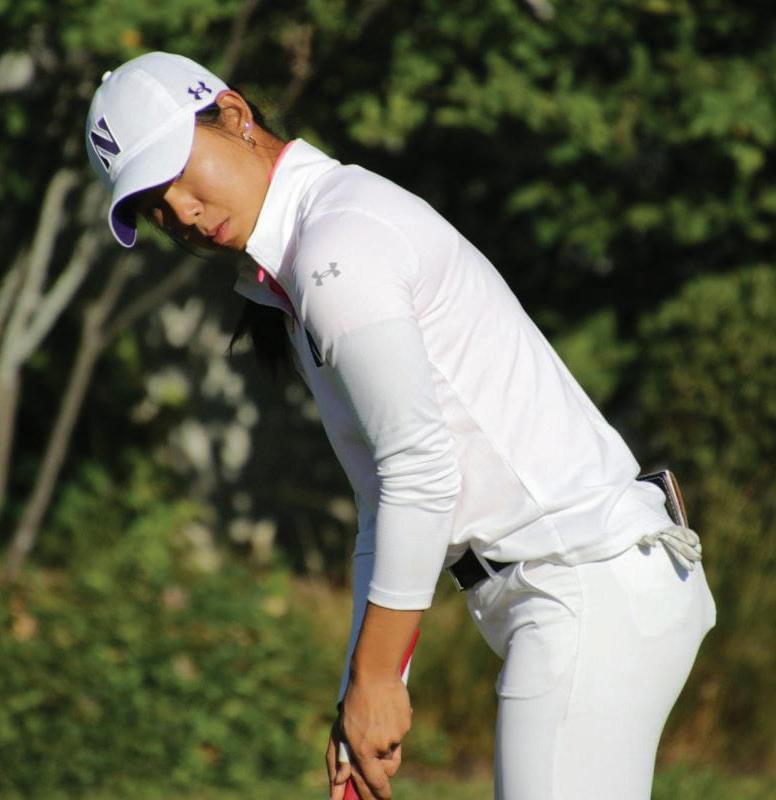The Daily Northwestern
5 CITY/Grant Street homes
Local residents object to small homes project


5 CITY/Grant Street homes
Local residents object to small homes project

Evanston churches, shelters house newcomers amid crisis
By EMMA RICHMAN the daily northwestern @emmarichman_After attending a training on faith communities helping with the migrant crisis, Grace Lutheran Church congregant Nancy Mathyer proposed hosting a migrant family in the church.
The congregation took it to a vote in October 2023, and the measure passed with overwhelming support.
“Part of Grace Lutheran Church is putting our faith into action courageously,” Mathyer said. “And this is it.”
More than 38,000 migrant individuals and families have arrived in Chicago since August 2022, according to the city’s New Arrivals Situational Awareness Dashboard. Some of these migrants have sought shelter in Evanston, but they’ve found few options.
With an already overcrowded houseless shelter system in Evanston, some local faith communities have stepped in to house
migrants.
The Margarita Inn, a yearround Evanston shelter operated by Connections for the Homeless, is currently at its capacity of about 60 people and has a four-to-eight month waitlist, according to Nia Tavoularis, the organization’s chief development officer.
The Margarita Inn is currently hosting one migrant family.
Interfaith Action of Evanston’s emergency overnight shelter is also at its capacity of 30 beds with a waitlist of about 45 people, Executive Director Susan Murphy Berube said. No migrants have approached Interfaith Action, and its shelters don’t provide long-term transitional housing for families, she added.
Evanston has been actively searching for “suitable local shelter options for migrants,” according to a Jan. 8 news release.
Vacant buildings found thus far are in “such poor condition that they cannot be made safe enough for housing migrants,” Cynthia Vargas, community engagement and communications
» See HOUSING, pag e 6
8 SPORTS/Women’s Golf
Northwestern wins PING/ASU Invitational, first tournament victory of 2023-24 season

In 2004, a judge told then 19-year-old Benard McKinley he would spend his next 97
birthdays behind bars. Last month, however, McKinley turned 39 as a free man and opened a hard-won birthday gift: an acceptance letter from Northwestern’s Pritzker School of Law.
Northwestern has applied for a city analysis to determine whether the University’s plans for potentially modifying Martin Stadium to hold football games will meet existing Evanston zoning requirements, according to a March 27 city manager’s report.
As Rebuild Ryan Field construction continues, NU is currently searching for a facility to host home football games, University spokesperson Eliza Larson said in a statement to The Daily.
NU is considering adding capacity to Martin Stadium — which hosts the University’s lacrosse and soccer teams — for up to 15,000 spectators, according to the city manager’s report.
Ald. Eleanor Revelle (7th) said after a “high level analysis,” city staff believes NU’s proposed use will align with current zoning regulations.
“On the one hand, it’s kind of a wild idea,” Revelle said. “On the other hand, it’s got a lot of pluses.”
Revelle said the Martin Stadium plan could funnel spectators to Evanston businesses on gameday and keep athletic contest tax revenues flowing to the city.

With a legal career ahead of him, McKinley wants to give back to the community he once took so much from, he said.
After five years of coursework at Stateville Correctional
Center, McKinley graduated in November in the inaugural class of the Northwestern Prison Education Program.
According to NPEP Director
» See MCKINLEY, page 6
Ex-football coach’s $130-million case survives NU motionBy JAKE EPSTEIN daily senior staffer @jakeepste1n
The Circuit Court of Cook County denied a defense motion to dismiss former head football coach Pat Fitzgerald’s breach of contract and defamation lawsuit against Northwestern and University President Michael Schill on Tuesday.
compensatory damages — with $68 million left on his contract that ran through 2023 and $62 million in calculated future earning losses — along with as-yet unspecified damages for emotional distress and punitive damages.
The defendants moved to dismiss the entire 51-page complaint, but NU’s motion was dismissed in its entirety. The Court found that Fitzgerald’s attorneys provided adequate defense for six separate counts NU attempted to dismiss.
“The Court finds that the Complaint and the motions themselves contain a detailed recitation of the facts of this matter,” the decision read.

Larson did not respond to questions about alcohol sales or potential environmental impacts from Martin Stadium renovations.
In the event NU proceeds with the Martin Stadium option for football games in the short term, Revelle said she wonders whether alcohol will be sold at the athletic facility. Currently, city code allows alcohol sales on NU’s Evanston campus.
“We have been in close contact with local venues to explore opportunities for the Wildcats to play at their facilities,” Larson wrote. “We are also exploring the feasibility of playing games on our campus in a temporary facility.”
williamtong2026@u.northwestern.edu beavilla or@u.northwestern.edu
Fitzgerald sued the University last October for breach of an oral contract, breach of employment contract, intentional infliction of emotional distress, defamation, false light and tortious interference with a business expectancy. The former head coach was fired in July 2023 after former players alleged a toxic environment of hazing and racism on the team.
Fitzgerald is seeking more than $130 million in
The case will now move forward in full. A judge for the Illinois Circuit Court for Cook County previously set an April 2025 trial date and denied Fitzgerald’s efforts to move the date up.
“We remain confident that the University acted appropriately in terminating Coach
Evanston resident Lois Hedman visited Ten ousand Villages, a nonpro t fair trade chain retailer, on March 27 — the last day she would visit that location. She knew the store would be closed for two weeks as it relocates downtown. A regular customer, Hedman said she likes to buy her co ee there — but that day, she purchased an extra bag.
Ten ousand Villages closed its 915 Chicago Ave. location a er 27 years last month. e store will reopen by April 13 at 1509 Chicago Ave.
From chocolates to socks to gardening supplies, Ten ousand Villages carries a diverse inventory of “one of a kind pieces,” according to Hannah Wymer, the retailer’s o site and volunteer manager. As a fair trade business, the store exclusively carries products purchased from ethical sources and artisans around the world.
Wymer said the team hopes to take advantage of foot tra c in the new downtown Evanston location.
“We’ve always been in south Evanston, so it’s bi ersweet to be moving,” she said. “But we are excited to be a part of that business district.” Inventory is largely determined by customer feedback, Wymer added.
Wymer said that being a fair trade retailer includes trying to “upcycle and refurbish” materials that could otherwise end up in a land ll. For example, the shop displays bags, baskets and clothing made from recycled sari fabric.
Hedman said she frequents the store mainly to purchase co ee, but she also visits when searching for gi s.
“If I’m buying gi s, I try to think about this place rst, because the fair trade nonpro t issue is very important to me,” she said. “I have one of everything, so it’s more for gi s at this point.”
While Hedman was “a li le disappointed” to hear the store was relocating — the store’s new location would require her to travel farther — she hoped the move would expose more people to fair trade.

“I think it’s a really great organization, and if the move makes more people see it, that would be fantastic,” Hedman said.
Business and Finance Manager Cheryl NesterDetweiler said she hopes the new storefront, with two double windows, will a ract more customers, especially because of downtown foot tra c. e new location will also be closer to Northwestern’s Evanston campus. While the store has already o ered a student discount, the new location in the “Northwestern bubble” will hopefully draw students to the store and engage them with fair trade, Marketing and e-Commerce Manager Michaela Dix said.
Currently, the shop operates with an intergenerational team of around 40 volunteers, including some connected to the NU community, Wymer said.
“We are hoping, as we move closer to the University, to have more of a connection to the University,” she said.
Dix added that being next to the Hya House hotel will expand their business, especially during Family Weekend. She called the new location “a really nice t” for the business.
One of the nonpro t’s goals for the move is to continue forging relationships with other organizations and retailers.




e store already partners with Evanston Made. Together, they host art from a di erent Evanston artist each month and hold a reception celebrating their work.
Its inventory also includes products from Chicago-based vendors like Mata Traders, a sustainable clothing line, alongside products from international retailers.
“Our goal is to be able to be open long-term and to be a good neighbor to the businesses in our neighborhood,” Wymer said.
rachelspears2027@u.northwestern.edu
hannahwebster2027@u.northwestern.edu











The Associated Student Government Senate elected Weinberg sophomore Grace Houren as speaker of the Senate and McCormick sophomore James La Fayette Jr. as parliamentarian at its Wednesday meeting. Houren, who previously served as parliamentarian, will succeed SESP senior Leah Ryzenman, who served as speaker for one year.
Along with the newly elected co-presidents and Executive Board members, Houren and La Fayette will take office during the sixth week of Spring Quarter.
As speaker, Houren said she hopes to establish a stronger connection with the administration, work with her deputy speaker to implement legislation and make Senate meetings more collaborative.
“I’m super excited,” Houren said. “I’m glad that everyone had confidence in me.”
Houren said she aims to help students feel their voices are being heard and represented through ASG.
Ryzenman said she admires Houren for taking initiative as parliamentarian on her ideas to improve ASG. Her past projects include a Code revision which allowed for remote Senate meetings and empowered the speaker and parliamentarian to propose legislation.
“I couldn’t imagine a better successor,” Ryzenman said. “She is one of the most proactive, detail-oriented and committed individuals I’ve had the pleasure of working with. We have worked extremely well together.”
La Fayette, who ran against Weinberg freshman and senator Eliza Marcus, said his goals as parliamentarian will be to make the Senate more accessible and make the Election Commission more transparent.
Weinberg senior and NU Active Minds Senator Ben Katz endorsed La Fayette for the position.
“Whenever there is a piece of legislation being discussed, his hand is one of the first ones raised,” Katz said. “He always gives good feedback and has good questions.”
During the meeting, members of the incoming Executive Board — appointed by Co-Presidents-Elect

SESP sophomore Caleb Snead and Weinberg sophomore Ty’Shea Woods — announced their plans for their respective committees.
Snead praised the incoming Executive Board members for their experience and commitment.
“They are an incredible bunch of incredibly intelligent people — extremely dedicated and committed to fostering a sense of belonging among the student body,” Snead said. “I really look forward to the work they’re going to do.”
As parliamentarian, La Fayette will lead the Rules Committee, which revises the ASG Code and Constitution and reviews legislation for constitutionality before it is voted on in the Senate. Rules Committee elections will take place at next week’s Senate meeting.
The Senate also passed a resolution to promote majority plant-based catering practices among student groups that receive ASG funding. The legislation requires annual organization training to include a presentation slide that provides information about sustainable catering options.
For the next several weeks, the outgoing speaker, parliamentarian, co-presidents and Executive Board







will help acclimate the incoming officeholders.
During her four-year career in ASG, Ryzenman eliminated several formal Senate requirements to simplify procedure, helped establish the first Senate retreat in 2022, created an orientation process for new senators and implemented legislation working groups during Senate meetings. She also improved communication around Funding Senate for student groups and helped establish the Board of Financial Review and the New Student Organization Support Fund.
Ryzenman, who currently works at an Illinois state representative’s office, said she is interested in applying her knowledge of international affairs and diplomacy to help others in the future.
Ryzenman will support Houren as she transitions into her role as the next speaker of the Senate in the following weeks.
“I have been working alongside Leah for a year now,” Houren said. “I feel really prepared. She’s done a lot of great stuff and laid out the role perfectly for me to step into.”
isaiahsteinberg2027@u.northwestern.edu





















Having spent the rst eighteen years of my life in New Delhi, India, I grew up fully assimilated in the community I interacted with every single day. Even London, where I spent my freshman and sophomore years of college, is so multicultural that feeling di erent is the majority sentiment.
Moving to Northwestern from University College London for my exchange year in the fall of 2023 marked the rst time I felt like the new kid, stepping at a di erent pace than the rest of the student body. ere were several things that I found novel and different from what I was used to.
e rst was the desserts — those strange, almost architectural cereal sculptures, in uorescent pink and blue that appear in dining halls on some days. And Hershey’s chocolate. Everyone eats it in kilos and kilos as though it doesn’t taste like acid.
e second, and possibly more pertinent, was the campus culture. As a student in London, I feel like an adult who just so happens to a end university. So, the American notion that college-is-life and life-iscollege was startling.
When I moved into my residence hall, I
meticulously decorated my side of my dorm room and thought about how, a year ago, my atmate and I were probably madly scrambling to make a new copy of a key to our at or trying to scrape away the tub of ice that had fused itself to the inside of our freezer.
While prying open a HelloFresh box, I told myself I was cooking, synthesizing, adulting, creating. My life in Evanston is categorized, ordered, the campus designed to be manageable.
Here, I lap the campus and see students in abundance. If there is a townsperson passing through — on a run, pushing a pram, walking a dog — it is o en a novel sight. When I lock myself out of my room, I go to Sargent Hall to ask for a temporary key. I don’t even break a sweat.
My friends and I congregate in sleek dining halls, the food steaming in metal tubs, or in the small restaurants downtown, a ten minute walk away. We venture into Chicago in groups, with an agenda, dabbling giddily with the psychedelic synergy of city life but never immersed in it.
I used to weave between towering buildings in Central London, stacks and stacks of rooms, teetering on top of one another. Now I squint at the Chicago cityscape miles away from where I stand near South Boulevard Beach and am wowed by its jagged heights. e easy routine of living at college in America is nothing like the chaos of the everyday life of a student in London.
During Wildcat Welcome, I heard a Peer Advisor tell their group of freshmen that in four years, they’d be adults entering the professional world, and NU was here to prepare them. Were they not adults now?
London certainly makes sure to remind you of the fact that you are. At eighteen, we haggle with real estate agents for second-year apartments, deal with the solitude of a city, live in it, as it is, in the night and in the day. We eat burnt scrambled eggs for breakfast, lunch and dinner. Our professors do not know our names. We are each one of many people in immense lecture theaters. ere are no fraternities or sororities. No built-in friend groups.
To an exchange student, the stream of regular NU life feels like a fast- owing, swarming river. It is rife with meetings and classes and extracurriculars and tinged with an urgency that the exchange students just do not have. Knowing that my reality awaits me on the other side of the Atlantic has made this year of studying abroad more about the experiences I am having.
Initially, I was skeptical of campus culture, of such neat life a er the miasma of London. Of regular scheduling and predictable days. When college life in London rippled through the city and took place in the tube, in creaky pubs, in vast parks, it could not be rivaled by the circular life of a campus university. I was soon charmed, though. e feeling of community that I so quickly found with the people I met
— even as someone who is here for a relatively short stint — was incredible. On the expanse of life here, I have to admit, one gets to know Evanston a li le too well. ere is no sense of anonymity and no escape from the NU world. But that is largely a positive. I never feel alone or lonely.
I am a li le jealous of the undergraduates who will be here for four years, then, because of the bubble that NU gives its students. From the outside, it does seem like a purple-tinged, Sims-like utopia. Everything you need is within a 15-minute walk. Friends, food, class.
I just wonder how its students will grapple with real life when they must leave this bubble. When they move into looming buildings in big cities and there are no Resident Advisors down the hall. When they must trade in purple for work clothes and briefcases. en again, if there’s anything I can infer from the quick and clever students I’ve met here, it’s that they’re probably going to nd a way to land on their feet.
Devaki Jayal is an exchange student om University College London. She can be contacted at devaki.jayal.24@u. northwestern.edu. If you would like to respond publicly to this op-ed, send a Le er to the Editor to opinion@ dailynorthwestern.com. e views expressed in this piece do not necessarily re ect the views of all sta members of e Daily Northwestern.
e Lake ll, Norris and Main Library are three of NU’s most popular studying and socializing spots. But combined, their surrounding areas have just 22 outdoor tables, which each seat four. is isn’t nearly enough to accommodate NU’s more than 8,000 undergraduate students.
Northwestern students need a seat at the table. An outdoor one, to be precise.
In February, ready to take advantage of a rare 70-degree winter day in Evanston, I went to Norris University Center determined to nd a table outside. But my plans were scrapped when I arrived to see every outdoor table occupied.
Studying in the grass was not an option — just ask anyone who has tried writing a research paper while hunched over on uneven ground. I accepted my fate and retreated indoors, sacri cing fresh air and sunlight for a more practical studying environment. As I sat at a table facing outside, I noticed I wasn’t alone in my retreat; I watched several other students walk through the East Lawn searching for a table, only to end up indoors. is scenario isn’t isolated to February’s unseasonably warm day. It’s an issue I’ve experienced and witnessed too o en on campus.




We have all seen this show before. No, I’m not just talking about the Biden-Trump rematch that is approaching this November — I am referring to an election where the two major-party candidates do not represent the wants or needs of the American people. e upcoming election poses a choice to young Americans who are increasingly dissatis ed with our political system: play the game or just say no. I challenge every one of my peers, every one of e Daily’s readers and every single individual who holds the two-party system in contempt to pick the la er and vote third-party or write someone in at the ballot box this November.
From a le of center point of view, one might retort: Isn’t democracy on the line? Aren’t I be er o voting for Joe Biden than I am handing the election to an authoritarian bigot? Casting aside the contestable aspersion that Donald Trump is an authoritarian bigot, these questions warrant examination.
Firstly, consider how the threat of losing democracy being dangled over your head since 2015 has been a tool used by the establishment le to prevent you from nominating a candidate who could truly e ectuate real change in the progressive direction. In 2016 and 2020, progressive Democratic voters were browbeaten with the idea that Hillary Clinton, Amy Klobuchar or Joe Biden’s electability was far more important than any of the items on the progressive wish list that Bernie
Although the broader Evanston campus boasts more than 100 total outdoor tables, their scattered placement in typically inconvenient locations diminishes their utility for studying and socializing. For example, four tables are tucked in Kresge Hall’s o en-forgo en courtyard, and one sits alone outside the Virginia Wadsworth Wirtz Center for the Performing Arts.
Today, students who do not want to ba le for a Norris picnic table but are eager to study outdoors have four options: one, bring a hammock or folding chair; two, sit on the ground; three, nd a bench; four, go back indoors. e rst three options fall short of supplying the same functional environment that si ing at a table o ers, and the fourth option keeps students inside. e limited outdoor tables on campus also present accessibility challenges. ose with disabilities, both visible and invisible, that make it di cult to create makeshi outdoor studying
Sanders wanted to deliver.
Now in 2024, progressives are still stuck with a $7.25 federal minimum wage, a broken health care system and vacuous talking points when it comes to Israel’s execution of the war in Gaza. A er all the compromises, do you really think it’s worth tacitly giving approval to the system that has betrayed you by voting for Biden?
Secondly, I want to challenge the proposition that a Trump presidency means the end of democracy. If you watch MSNBC, you will see pundits nod along as Democratic politicians claim that “if you are not willing to just support the president you might as well just get your MAGA hat.” I understand how Trump’s behavior following his loss in 2020 and recent comments on the campaign trail create the concern that he will precipitate the collapse of American democracy.
But these claims are overblown and minimize the ability of American institutions to prevent such a disaster. e Supreme Court, Congress and the extensive federal bureaucracy would not allow it. Do not be deceived by this apocalyptic hysteria — it is being projected to manipulate you into siding with the status quo instead of ghting it.
Now, for those to the right of center — consider the many ways Donald Trump has turned out to be another big government statist that breaks promise a er promise. On the 2016 campaign trail, Trump said he would get us out of foreign wars. He did not. Instea,d he appointed an architect of the Iraq War — John Bolton — to be his National Security Advisor and used drone strikes more than his trigger happy predecessor.
In his rst try at the nomination, Trump said he
arrangements may have no choice but to stay indoors.
Given the Lake ll and Norris’ plentiful green space and the sizable patio beside University Library, the University administration has a perfect opportunity to act.
In 2022, NU announced a renovation of Norris’ East Lawn to create “a prime location for student, faculty, sta and community interaction and collaboration on the Evanston campus.” e new East Lawn would feature shaded pavilions and dozens of movable tables with chairs and umbrellas. But, the construction that was supposed to start last summer never began.
Consider the sizable patio situated beside Main Library, an area with no tables at all. is empty space presents an easy win for students and administration. Without structural renovations, the patio can readily evolve into a hub for student activity by adding weather-proof, umbrella-covered tables and chairs.
Yes, some students prefer indoor studying. But the spring time crowds, a er months conned inside by winter’s harsh weather, reveal a widespread eagerness to be outside. Adding more outdoor tables for studying and socializing will
would build a wall on the southern border. He completed only a small fraction. He said he would repeal Barack Obama’s unconstitutional executive order that granted amnesty to hundreds of thousands. He continued it. He said he would eliminate the national debt. Instead, he grew it by almost 8 trillion dollars. He said he would repeal and replace the A ordable Care Act. He didn’t.
His biggest accomplishments: a tax cut for Wall Street, the COVID-19 vaccine and the moving of the United States embassy in Israel to Jerusalem. I do not recall anyone chanting “cut corporations’ taxes” or “move the embassy” at a single one of his rallies, but those were his priorities.
So many Americans of all ideological inclinations are politically homeless. ey may feel helpless in the face of a powerful establishment. But the power the American people possess is that of their vote. If every Gen Z voter deviates from the two-party norm, imagine the magnitude of the message this would send to the consultants and donors.
In the days following the election when the winner is determined, when the exit polls are released and when the dust se les, the political and consultant class will look around and see that we put principle over party and kept our hands clean from what may be one of the worst elections in American history.
allow more students to enjoy the campus’ seasonal revitalization alongside their coursework.
Allocating funds to purchase outdoor tables for Main Library, the Lake ll and Norris is a practical enhancement and prudent investment in the NU student experience. While the initial costs may spark some pushback, the long-term bene ts are signi cant. Equipping these locations with tables and chairs will transform them into vibrant hubs of student community and productivity during warm months.
e call for outdoor tables cannot be tabled any longer.
I contacted Northwestern Facilities — who forwarded my message to the East Lawn renovation project manager — but received no response.
Aaron Boorstein is a Medill School of Journalism senior. He can be contacted at aaronboorstein2024@u.northwestern.edu. If you would like to respond publicly to this op-ed, send a Le er to the Editor to opinion@dailynorthwestern. com. e views expressed in this piece do not necessarily re ect the views of all sta members of e Daily Northwestern.
For a moment Tuesday, a verdant but vacant lot on Grant Street sat in silence as the spring showers paused. Yet at the future site of Evanston’s first “pocket neighborhood” of small homes, the quiet may not last for long.
The silence belied months of uproar between neighbors and the housing development’s proponents. Weeks after City Council’s 7-2 approval of the 12 homes, the debate has ended, but the enmity remains.
Everything from construction materials to wider concerns about development played a role in the dispute. Small but contested, the greenlit homes in the 7th Ward neighborhood brought broader city issues to the fore, said Garin Ferri, a resident who opposes the project.
“I just wish that the rest of Evanston would understand how much this impacts all of them,” he said.
BluePaint Development CEO David Wallach
said his vision for the 600-square-foot “efficiency homes” on the narrow adjoining lots could encourage the city to offer more housing options. The 12 all-electric homes will each include two bedrooms, a bathroom, a kitchen and a living area. Fifteen parking spots and a common barbecue area will sit next to the homes.
In February, Wallach said he expected the homes to retail for under $350,000 apiece. Some neighbors said the price per square foot stood nearly double the citywide average, but Wallach said the lower unit price for a singlefamily home made the small homes more affordable for first-time buyers.
Given the housing crisis in the U.S., “making more and better homes should be everybody’s goal,” Wallach added.
Some neighbors said they support creating more affordable housing but oppose the specifics of the BluePaint Development project. More than a hundred people signed a petition last year calling on the city to reject the project, and many attended meetings at the Lorraine H. Morton Civic Center to voice their chagrin.
On Feb. 26, City Council decided to send

Wallach’s bid for a special use permit to build the homes back to the Planning and Development Committee for further discussion.
However, the committee again approved the permit, and the council followed with its own go-ahead on March 11 — but with two new requirements.
First, the development must contribute one affordable unit to a land trust. Second, the project must have a completion bond — a financial pact intended to ensure the project gets finished. That requirement arose amid concerns about the developer’s financial viability.
Last year, Wallach filed for Chapter 11 bankruptcy reorganization for a separate firm, Wally Walls. The Wisconsin-based company manufactures the insulated wall panels Wallach









planned to use for the Evanston small homes. The developer said he will have an affiliate to supply the panels while “retooling” his Kenosha plant, but critics pointed to the filing as another reason for concern.
“Except for a few bumps in the road, which occur in any project anywhere, we followed a pretty normal course of zoning,” Wallach said.
He anticipates construction beginning in June and said the work should take six to nine months.
On Grant Street, resident Amy Cummings lamented the neighbors’ defeat at City Council. The project could bring a lot of uncertainty to the block, she added.
“We’re sad that nobody stood up for us,” she said.
After City Council made its final decision in favor of Wallach’s plan, some residents said they felt disappointed and unheard by their elected representatives. Though resident Joy Joyce said the back-and-forth may well have created an “improved” plan and that a final judgment still lies ahead, Ferri called the process “shocking.”
The decision revealed a “careless hubris” by city leaders toward their concerns and the Land Use Commission’s recommendation to reject the project, Ferri said.
Still, “hope isn’t lost” in Evanston, he said. “We did come together and work hard to help enact change,” he added. “It’s unfortunate that it didn’t happen.”
shungraves2027@u.northwestern.edu































































































From page 1
manager of the City of Evanston, told The Daily in an email.
While Evanston struggles to find housing for newly arrived migrants, some local faith communities have partnered with the Faith Community Initiative, an organization that provides immigration case management services and works with Chicago-area faith communities to house and financially support migrants.
The Faith Community Initiative has housed about 50 families, Program Manager Emily Wheeler said. The organization has been working with 16 different faith communities, including the Grace Lutheran Church and the Evanston Friends Meeting, she said.
The Grace Lutheran Church signed an agreement with the Faith Community Initiative in November 2023, committing to housing a Venezuelan family of four for a year in the church’s extra rooms and providing them $1,000 a month in Visa gift cards, Pastor Luke Harris-Ferree said.
The family — a mother and three children — were bused to Chicago in late summer 2023 soon after they sought asylum in Texas, Harris-Ferree said. They were sleeping in a tent outside a police station, and the youngest child — a 1-year-old — was falling ill, he said.
In addition to providing housing and financial assistance, the Grace Lutheran Church got the family on medical insurance and enrolled the two older children in Evanston schools, Harris-Ferree said. The 1-year-old is now healthy, and the family seems to be doing much better, they added.
“The mom just really wants a better life for
From page 1
Jennifer Lackey, it is the first bachelor’s degree-granting program offered to incarcerated students by a top 10 university in the U.S. McKinley said he dreamed of becoming a lawyer, but growing up in Chicago’s Austin neighborhood, “those dreams got thrown out.” Instead of mental health support and legal resources, McKinley said his community had drugs and gangs.
At 16, McKinley was arrested for a gangrelated murder. At 19, he was sentenced to 100 years in prison without parole, a sentence later deemed unconstitutional for juvenile offenders. While serving time, he took legal action to reduce his sentence to 25 years, of which he served 22.5 before his release in January.
McKinley’s interest in law was revived at Menard Correctional Center, the first prison he served time in. There, he saw correctional officers beating individuals and denying them medical care and food, but no one knew how to advocate for them,
her kids, a more stable life,” Harris-Ferree said. “Realizing the deep fear they did live under in Venezuela and how they were treated from some of the stories she shared was horrible.”
Local Quaker community Evanston Friends Meeting is also hosting a Venezuelan family of five in a two-room apartment at the back of its meeting house.
Before the recent migrant crisis, faith communities in Evanston had already been supporting migrant families, many of whom arrived from Afghanistan and Syria, Evanston Friends Meeting congregant Richard Graef said.
The value of helping one’s neighbor and those in need is at the root of all major religions, said Graef, the Quaker representative on Interfaith Action of Evanston’s immigration subcommittee.
“I hate when people talk about Christian values or Quaker values or Jewish values,” Graef said. “They’re all the same. They’re basic human responsibility — human values — which we’re talking about.”
The Faith Community Initiative still has many families that need shelter, Wheeler said.
The organization has been actively seeking out more faith communities to host migrant families, especially in suburbs like Evanston whose resources are not as overwhelmed as Chicago, she said.
“I think that our responsibility — more than just as faith communities, as Americans — is to fill in the gap that exists in the social services that our government provides, which are woefully underfunded and under-resourced,” Wheeler said.
emmarichman2027@u.northwestern.edu
he said. So, he started learning.
“My prison cell became my university,” McKinley said. “Even before I was admitted to Northwestern.” McKinley earned his GED and paralegal diplomas by 25, along with a reputation among others in the prison for his knowledge of law. While incarcerated, McKinley said he filed court complaints for those who experienced civil rights violations.
For example, one incarcerated individual was given medication to “shut him up,” which caused damage to his gut health, McKinley said. McKinley helped him with the grievance process and filed his complaint in U.S. federal court.
As McKinley became more familiar with the law, he petitioned the Illinois Appellate Court to commute his century-long sentence.
“That was a sentence that I couldn’t understand, so I psychologically refused to acknowledge it,” he said. “And I also think that’s where my strength came in.”
Though he received denial after denial, he kept fighting.
From page 1
Fitzgerald and we will vigorously defend our position in court,” wrote University spokesperson Jon Yates in a statement to the Daily.
In a statement from Winston & Strawn Partners Dan Webb and Matthew Carter,
Fitzgerald’s counsel said it will move the case forward “expeditiously” to its trial date.
“We will take all steps necessary to pursue Coach Fitzgerald’s serious claims and to protect his rights, name, and reputation,” Webb and Carter said in the Tuesday statement.
jacobepstein2026@u.northwestern.edu

His case made it to the U.S. Court of Appeals for the 7th Circuit, which invalidated his original sentence. Ultimately, McKinley successfully got his sentence reduced twice — to 39 years in 2016 and to 25 years in 2020.
“When Benard puts his mind to something, he will not relent until he follows through,” said fellow NPEP graduate James Soto.
Lackey said McKinley’s educational pursuits while incarcerated helped the court determine the quality of his character.
“Prisons need educational programs,” McKinley said. “Knowing that a person is uneducated and putting them back out uneducated, it’s like you’re betting on him to go back to what he used to be doing, or what he’s known all his life.”
Lackey said education also enables those who are incarcerated to find a sense of meaning, which may be even more important than its efficacy in lowering recidivism rates.
McKinley said studying the law allowed him to find his purpose: opening a legal clinic. He’s one step closer to his goal with his recent
acceptance to Pritzker, he said.
McKinley plans to open the clinic with his former NPEP tutor, Haley Greep. He studied with Greep for the LSAT and the pair discovered they had the same professional aspirations — to create a community hub where those from underserved communities could secure legal assistance.
“I think Benard would agree that (the clinic) would also provide mental health resources to the community and be a place where people feel safe and listened to, and that if they ever run into trouble, that we got them,” Greep said.
As with much of the work he did while incarcerated, McKinley wants to fight “with the underdog,” he said. In doing this, he added he hopes to not just fight for them but to help them fight for themselves.
“I can never measure up to what I’ve taken,” McKinley said. “However, this is a start to allow me to show that I’m committed to the positive transformation of my community.”
naomitaxay2027@u.northwestern.edu





At the sight of purple confetti and a “Congratulations!” on her computer screen, incoming Weinberg freshman Ameera Hamadeh joined the pool of Northwestern’s regular decision admitted students last week. Though she could hardly believe it at the time, Hamadeh said she already feels at home.
“My parents always told me, when it came to college, ‘You’ll know when you know,’” Hamadeh said. “As soon as I got in, I felt like I knew exactly where I needed to be.”
Over 50,000 students applied to NU in the 2023-24 admissions cycle, which saw an increased acceptance rate of 7.5%. About half of admits were accepted during the regular decision cycle.
Following the Supreme Court ruling against using race as a factor in college admissions in June, this year’s application introduced a new personal statement essay and optional supplemental essay prompts for applicants to discuss their identity, background and interests.
Many admits said a stand-out feature of NU was the quarter system and, with it, the ability to explore many interests with classes.
An Illinois native, Hamadeh said she appreciates the flexibility of the quarter system because it allows her to take classes outside her major while balancing her graduation requirements.
“I knew that in college, I didn’t want to burn myself out in one category,” Hamadeh said.
When she arrives in fall, Hamadeh hopes to pursue a degree in legal studies and join the Academy of Music and Arts for Special Education, an organization that provides music and art education to individuals with special needs.
Despite the typical dread that comes with writing numerous essays when applying to colleges, Hamadeh said she felt comfortable with NU’s additional supplemental essays.
“With Northwestern, it was a different case because there’s just so much I wanted to say,” Hamadeh said.
With Evanston being close to home, Hamadeh said she’s glad to have a background in the

area and will feel more comfortable to explore more on her own.
Incoming Weinberg freshman Sol Rivera said she’s excited to try out for the sailing team and get involved with Hillel. While she hopes to study English next fall, she likes that NU encourages interdisciplinary studies.
“The two supplementary essays were able to give the school a little bit more detail into what I was doing, my interests and what my passions were — and also my background too, especially because affirmative action was taken away, which is something that really affected me,” Rivera said.
Some students traveling far from home said they are excited to assimilate into NU and

For an application, contact Stacia at s-campbell@northwestern.edu.
Deadline for Submission: Thursday, April 25, 2024
Chicago life. Many said they like the proximity and accessibility of Evanston to Chicago.
From Fayetteville, Georgia, incoming Bienen freshman Garrison Rider said NU’s location was ideal for him.
“I live in the south, so I enjoy my rural, tightknit communities,” Rider said. “Northwestern being right in Evanston, where it is a smaller college town right outside of a big city like Chicago, was absolutely perfect for me.”
Rider said he hopes to establish a winter guard group and have the freedom to pursue endeavors he’s passionate about.
Incoming Medill freshman Trois Ono said when she opened her application decision at 6 a.m. Japan Standard Time, she thought she
was “still dreaming.”
Having gone to the same school in Yokohama, Japan, for over 10 years, Ono said she’s ready for a change in scenery. As an international student, she said she’s anxious about a change in routine but is excited to gain insight into American culture. She hopes to join Northwestern Flipside in the fall for its comedic quality.
“I think it is really scary, though,” Ono said. “I’m suddenly having to move to Chicago and live independently without my parents and without any close friends, but I think I kind of need that experience. It’s just part of life.”
kelleylu2027@u.northwestern.edu

Upon nightfall in College Park Saturday, two bitter rivals will charge at one another fullspeed ahead, eyeing a monumental Big Ten result. Befitting the Old Line State’s official sport of jousting, conference and national championship contenders No. 1 Northwestern and No. 2 Maryland are set for their 20th all-time face-off.
One of the nation’s top attacks will collide with a stingy defense, and two elite draw units will duke it out between the 30s. The showdown boasts veteran superstars, elite youngsters and two of the greatest coaching minds at the collegiate level, all of whom look to outduel a familiar foe under the lights of Maryland’s Field Hockey & Lacrosse Complex.
“We expect a great challenge,” coach Kelly Amonte Hiller said of the impending matchup during last Saturday’s postgame press conference. “They play extremely well at home.”
Both battle-tested teams have struck scorching strides as of late. The Terrapins (10-2, 3-0 Big Ten) sit atop the conference totem pole and have won seven of their last eight games. Meanwhile, the Wildcats (10-2, 2-1 Big Ten) have nine victories in their past 10 matchups.
NU’s best lacrosse this season has come inside Ryan Fieldhouse, where Amonte Hiller’s squad boasts a 7-0 record. The ’Cats secured two home wins over Maryland last year, but the Terrapins will play hosts to the Lake Show Saturday for the first time since 2022.
Maryland and NU have three common opponents thus far, with both groups defeating Syracuse, Denver and Rutgers. Amonte Hiller and Terrapins coach Cathy Reese’s teams have both spent time atop the national polls this season, and Maryland’s slip-up against then-No. 14 Penn vaulted the ’Cats to the No. 1 spot.
All will be for naught, unless the visitors can take care of business in enemy territory — a facility where they haven’t escaped unscathed since their first-ever College Park campaign in 2006.
With conference and national implications — as well as bragging rights — on the line, here are three key storylines ahead of NU’s Saturday
night game against its east-coast rival.
Terrapin defense will test the ’Cats’ starpower
After Abby Bosco graduated last summer and began her professional career in the Athletes Unlimited league, Reese landed a high-profile replacement in the transfer portal: reigning Big Ten Defender of the Year Meghan Ball.
Ball was a Rutgers superstar, hauling in individual accolades and wreaking havoc on the defensive end and in the draw circle during her four seasons in Piscataway, New Jersey. She picked up right where she left off in her new digs, scooping 22 ground balls, racking up 21 caused turnovers and pulling down 48 draw controls in 12 games.
With an elite netminder leading the shotstopping effort in Maryland goalkeeper Emily Sterling, the Terrapins have shut down several significant opposing threats this season.
When Maryland knocked off then-No. 2 James Madison March 10, the Dukes’ sophomore star Maddie Epke — a Tewaaraton watchlist addition — was held to just one goal on five shots. The Terrapins also held Syracuse attacker Emma Ward to one goal on six attempts earlier in the season.
While NU carries one of the nation’s most potent scoring presences, graduate student attackers Izzy Scane and Erin Coykendall and sophomore attacker Madison Taylor will certainly face more resistance than they have in recent games.
Ahearn vs Smith: A draw duel for the ages
Last season, Terrapin midfielder Shaylan Ahearn had junior midfielder Samantha Smith on the ropes during their 2023 Big Ten Tournament championship duel. Ahearn’s side won nine of the game’s first 11 draw controls, but Smith steadied the ship in the second half, helping her team secure a 14-9 victory.
Following her championship win, Smith told The Daily that having a 15-second memory was vital to success in a cerebral space like the draw circle. That tactic will once again be put to the test Saturday night.
Ahearn is up to her usual antics on the draw this season, pulling down 56 draws, including a season-high nine draw controls against Drexel Feb. 21. However, Smith has soared toward the nation’s pinnacle in the circle, securing 72 draw controls this season.

With two All-Big Ten midfielders going toe-to-toe at the halfway line, much of the onus will fall on their supporting teammates in the circle.
Amonte Hiller has featured Taylor, Scane, senior defender Kendall Halpern, junior midfielder Emerson Bohlig and junior defender Sammy White on her circle units this season. Bosco and Maryland midfielder Shannon Smith will be crucial for the hosts’ efforts. Coykendall and Clevenger mark matchup of elite feeders Maryland attacker Eloise Clevenger and Coykendall both carry a scoring threat whenever the ball flies into their sticks, but the
veteran attackers have made their bread and butter in setting up cutters on a silver platter.
Clevenger sits second in the NCAA with 41 assists this season, spearheading a balanced Maryland attack alongside attackers Hannah Leubecker, Libby May and Kori Edmondson. The All-American has also scored 15 goals in 2024.
For NU, Coykendall has amassed a team-high 33 assists thus far — good for the 12th most in the country. Behind her distributive savvy and intelligent play, the ’Cats have found doubledigit tallies in every game this season.
jacobepstein2026@u.northwestern.edu
After finishing a mere stroke short of first place at early March’s Darius Rucker Intercollegiate, Northwestern entered its next competition looking to finally get over the hump.
Coach Emily Fletcher’s squad did just that, recording its first team title this season at the PING/ASU Invitational Saturday with an 11-under 853 (284-285-284) over 54 holes.
The victory seemed almost inevitable for the Wildcats, who have finished as runners-up in three of their last six tournaments leading up to this past weekend.
“This group has just continued to compete hard,” Fletcher said. “For them to get a win, I’m just really proud of them, and I think it’s an encouragement to them to keep doing what they’ve been doing.”
Facing off against a stacked 17-team field featuring seven of the nation’s top 15 squads, NU edged second-place California by three strokes.
Leading the ’Cats was freshman Ashley Yun, who logged a career-best performance, finishing in third with a 6-under 210.
Fletcher said the freshman showed early flashes of brilliance but has not been able to put it together for a full tournament until this past weekend. The PING/ASU Invitational marked Yun’s first time breaking the top 15.
“We knew Ashley would make great contributions to our team this year,” Fletcher said. “It was really encouraging for us to see her get some results and see her hard work come to fruition — but we’re not surprised by this.”
Yun paced NU in first-round play, tallying a tournament-best 4-under 68 to lead the ’Cats to a share of third place on day one.
Senior Jennifer Cai followed not too far behind,
firing a 3-under 69 and maintaining her exceptional form after earning her first career victory at the Darius Rucker Intercollegiate. Cai concluded the tournament tied for ninth place with a 3-under 213, her seventh top-20 result this season.
The senior’s recent success serves as a testament to her resilience, Fletcher said. Last year, Fletcher left the 2022 All-Big Ten first teamer off her starting rotation for a stretch of tournaments.
“(Jennifer) has been just relentless in her work ethic and her desire and her willingness to learn and improve,” Fletcher said. “It’s really fun to see her starting to play well this time of year.”
Standing three shots off the lead, NU climbed the leaderboard on day two.
Behind sophomore Dianna Lee’s 4-under 68 — an 11-stroke improvement over her first round performance — the ’Cats earned a share of first place with No. 3 UCLA. No other player on Fletcher’s squad finished the second round under par.
With several teams within striking distance, the victory was far from guaranteed. It would take another round of solid play if NU were to secure the title.
The ’Cats delivered as Yun and Cai both logged a 3-under 69 to lock up first place. The duo hit a collective eight birdies on day three en route to a pair of top 10 finishes.
NU will be back on the road next week for the Silverado Showdown, its last regular season tournament.
With postseason play looming, Fletcher will rely on her squad’s ability to fill in for one another and bounce back from adversity.
“Anybody can step up and be one through five or five through one,” Fletcher said. “I think that’s one of our great strengths, and I think it’s something that will keep us very competitive into the postseason.”
